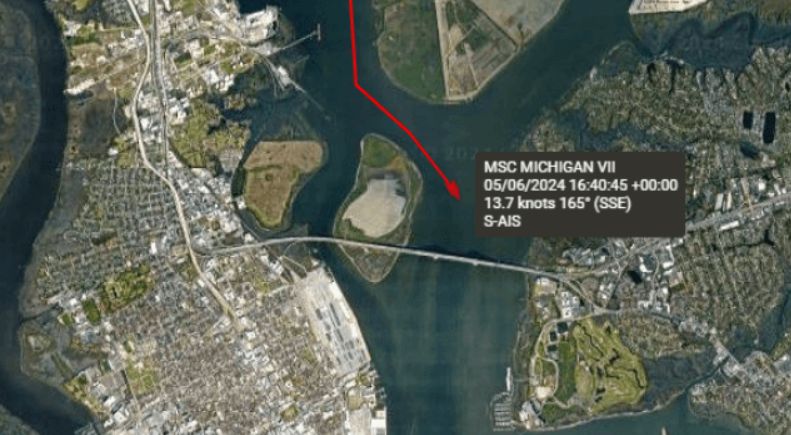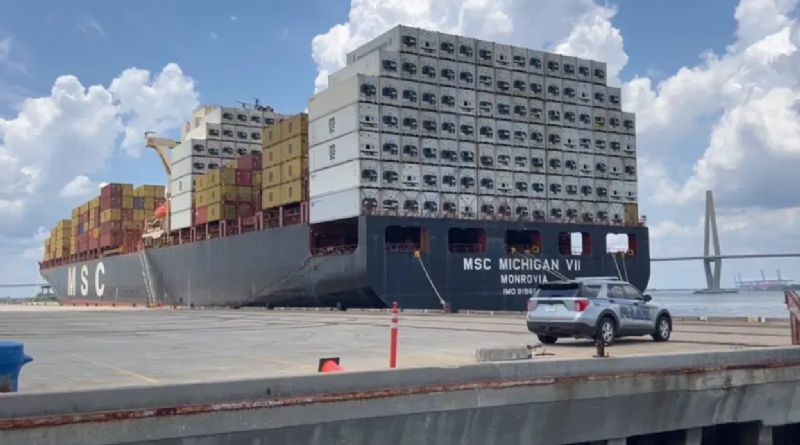
On Wednesday, an MSC boxship lost control of its main engine and accelerated to 17 knots on the Cooper River at Charleston, South Carolina, forcing the temporary closure of the Arthur Ravenel Jr. Bridge.
At about 1217 hours, U.S. Coast Guard Sector Charleston received a call from the Charleston Harbor Pilots dispatch center. The container ship MSC Michigan VII had experienced a failure of her propulsion control systems while outbound from the North Charleston Container Terminal. AIS data shows that the vessel departed the terminal and got under way at about 1145 hours, and after making her turn to head out the river, she rapidly accelerated. By 1630, the Michigan had accelerated to more than 15 knots, and she maintained this speed as she approached the Ravenel Bridge. This was five knots faster than her inbound transit the day before.
Given the precedent set by the collapse of the Francis Scott Key Bridge in Baltimore in March, officials in Charleston took the event seriously. Response boats from multiple agencies took to the shipping channel to warn boaters and clear the path for the speeding ship. Local police closed and cleared the traffic lanes on the Ravenel Bridge, loading a few bikers and pedestrians into squad cars to help them get off in time.
“I threw my bike down, grabbed my phone, and jumped in the back of the police car with a couple of other pedestrians and it was kind of scary. We were going across the bridge trying to get other pedestrians and warn them that there was an out-of-control boat headed towards the bridge," Charleston resident Lisa Riente told the local NBC affiliate.
The pilots aboard the Michigan safely navigated out through the channel at high speed, and the ship anchored nine miles offshore to await an inspection. The bridge reopened once the ship passed underneath.
The bridge was unharmed, but according to the AP, the ship's passage did have an effect. Two boaters sustained minor injuries when the wake pushed them onto rocks, and local officials have received reports of minor damage along the shore. The Coast Guard is rechecking the positions of all nearby aids to navigation (ATON) to ensure that they are on station.
The Michigan has been issued a captain of the port order to remain at anchor until further notice, and the Coast Guard is investigating the circumstances of the vessel's propulsion issue.
"The pilot on board indicated the vessel lost ability to control the engines and they were stuck nearly full ahead with the vessel making between 14 to 17 knots," said Coast Guard Sector Charleston Deputy Commander Randy Preston at a press conference. "Any time a vessel can’t control its propulsion it’s concerning. But thanks to our partners, our maritime partners, our local law enforcement partners, it turned out well and that’s due to our intense partnership and coordination."
MSC Michigan VII (ex name Sealand Michigan) is an 80,000 dwt, 6,700 TEU container ship built in 2000. The vessel is managed by MSC, and was acquired and renamed in October 2022 during the market-leading carrier's campaign of used boxship acquisitions.
During a port state control boarding in Boston on February 17, Coast Guard inspectors noted issues with the steering gear alarm panel aboard the Michigan VII, along with "excessive" oil leakage on two auxiliary generators, a faulty fire alarm and an unapproved 440V outlet in a generator space. All were rectified with assistance from the class society.


We use cookies to improve your experience. By continuing to use our site, you accept our Cookies, Privacy Policy,Terms and Conditions. Close X